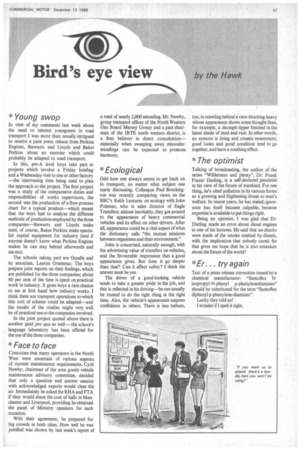Bird's eye view
Page 85

If you've noticed an error in this article please click here to report it so we can fix it.
by the Hawk *Young swop
In view of my comments last week about the need to interest youngsters in road transport I was more than usually intrigued to receive a joint press release from Perkins Engines, Stewarts and Lloyds and Baker Perkins about an exercise which could probably be adapted to road transport.
In this, pre-A level boys take part in projects which involve a Friday briefing and a Wednesday visit to one or other factory —the intervening time being used to plan the approach to the project. The first project was a study of the comparative duties and responsibilities of works supervisors, the second was the production of a flow-process chart for a typical product—which meant that the boys had to analyse the different methods of production employed by the three companies—Stewarts and Lloyds make steel, of course, Baker Perkins make specialist capital equipment for industry (and if anyone doesn't know what Perkins Engines makes he can stay behind afterwards and see me).
The schools taking part are Oundle and its associate, Luton Grammar. The boys prepare joint reports on their findings, which are published for the three companies; about 60 per cent of the time is spent on practical work in industry. It gives boys a rare chance to see at first hand how industry works. I think there are transport operations to which this sort of scheme could be adapted—and the results of the studies might very well be of practical use to the companies involved.
In the joint project quoted above there is another quid pro quo as well —the school's language laboratory has been offered for the use of the three companies.
*Face to face
Conscious that many operators in the North West were uncertain of various aspects of current maintenance requirements, Cyril Newby, chairman of the area goods vehicle maintenance advisory committee, decided that only a question and answer session with acknowledged experts would clear the air. Immediately he asked the RHA and FTA if they would share the cost of halls in Manchester and Liverpool, providing he obtained the panel of Ministry speakers for each occasion.
With their agreement, he prepared for big crowds in both cities. How well he was justified was shown by last week's report of a total of nearly 2,000 attending. Mr. Newby, group transport officer of the North Western Gas Board Mersey Group and a past chairman of the IRTE north western district, is a firm believer in direct consultation— especially when sweeping away misunderstandings can be expected to promote harmony.
*Ecological
Odd how one always seems to get back on to transport, no matter what subject one starts discussing. Colleague Paul Brockington was recently comparing views on the BBC's Reith Lectures on ecology with John Polmear, who is sales director of Eagle Transfers; almost inevitably, they got around to the appearance of heavy commercial vehicles and its effect on other drivers. After all, appearance could be a vital aspect of what the dictionary calls "the mutual relations between organisms and their environment."
John is concerned, naturally enough, with the advertising value of transfers on vehicles, and the favourable impression that a good appearance gives. But does it go deeper than that? Can it affect safety? I think the answer must be yes.
The driver of a good-looking vehicle tends to take a greater pride in the job, and this is reflected in his driving—he can usually be trusted to do the right thing at the right time. Also, the vehicle's appearance inspires confidence in others. There is less tedium, too, in crawling behind a view-blocking heavy whose appearance shows some thought than, for example, a decrepit tipper finished in the latest shade of mud and rust. In other words, an eyesore is tiring and creates resentment; good looks and good condition tend to go together, and have a soothing effect.
*The optimist
Talking of broadcasting, the author of the series "Wilderness and plenty", Dr. Frank Frazer Darling, is a self-declared pessimist in his view of the future of mankind. For one thing, he's cited pollution in its various forms as a growing and frightening threat to man's welfare. In recent years, he has stated, ignorance has itself become culpable, because expertise is available to put things right.
Being an optimist, I was glad that Dr. Darling made an error about diesel engines in one of his lectures. He said that no checks were made of the smoke emitted by diesels, with the implication that nobody cared. So that gives me hope that he is also mistaken about the future of the world!
*Er... try again
Text of a press release correction issued by a chemical manufacturer: "Santoflex Nisopropyl-N-phenyl p-phenylenediamines" should be substituted for the term "Santoflex diphenyl p-phenylene-diamines".
Lucky they told us!
I wonder if I spelt it right.
























































































































































